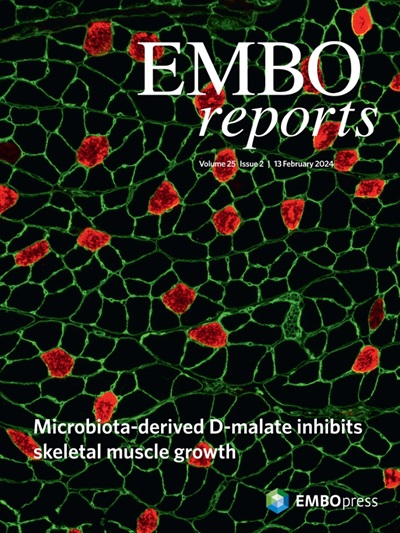Terminal α1,2-fucosylation of glycosphingolipids by FUT1 is a key regulator in early cell-fate decisions.
IF 6.5
1区 生物学
Q1 BIOCHEMISTRY & MOLECULAR BIOLOGY
引用次数: 0
Abstract
The embryonic cell surface is rich in glycosphingolipids (GSLs), which change during differentiation. The reasons for GSL subgroup variation during early embryogenesis remain elusive. By combining genomic approaches, flow cytometry, confocal imaging, and transcriptomic data analysis, we discovered that α1,2-fucosylated GSLs control the differentiation of human pluripotent cells (hPCs) into germ layer tissues. Overexpression of α1,2-fucosylated GSLs disrupts hPC differentiation into mesodermal lineage and reduces differentiation into cardiomyocytes. Conversely, reducing α1,2-fucosylated groups promotes hPC differentiation and mesoderm commitment in response to external signals. We find that bone morphogenetic protein 4 (BMP4), a mesodermal gene inducer, suppresses α1,2-fucosylated GSL expression. Overexpression of α1,2-fucosylated GSLs impairs SMAD activation despite BMP4 presence, suggesting α-fucosyl end groups as BMP pathway regulators. Additionally, the absence of α1,2-fucosylated GSLs in early/late mesoderm and primitive streak stages in mouse embryos aligns with the hPC results. Thus, α1,2-fucosylated GSLs may regulate early cell-fate decisions and embryo development by modulating cell signaling.FUT1对糖磷脂的末端α1,2-岩藻糖基化是早期细胞命运决定的关键调节因子。
胚胎细胞表面富含糖磷脂(GSLs),这些物质在分化过程中会发生变化。早期胚胎发生过程中 GSL 亚群变化的原因仍然难以捉摸。通过结合基因组学方法、流式细胞术、共聚焦成像和转录组数据分析,我们发现α1,2-岩藻糖基化的GSLs控制着人类多能细胞(hPCs)向生殖层组织的分化。过量表达α1,2-岩藻糖基 GSL 会破坏 hPC 向中胚层的分化,并减少向心肌细胞的分化。相反,减少α1,2-岩藻糖基化基团可促进 hPC 分化和中胚层对外界信号的承诺。我们发现,中胚层基因诱导剂骨形态发生蛋白 4(BMP4)会抑制α1,2-岩藻糖基化 GSL 的表达。尽管存在 BMP4,α1,2-岩藻糖基化 GSL 的过表达仍会损害 SMAD 的激活,这表明α-岩藻糖基末端基团是 BMP 通路的调节因子。此外,小鼠胚胎早期/晚期中胚层和原始条纹阶段缺乏α1,2-岩藻糖基化的GSL,这与hPC的结果一致。因此,α1,2-岩藻糖基化的GSL可能通过调节细胞信号传导来调控早期细胞命运决定和胚胎发育。
本文章由计算机程序翻译,如有差异,请以英文原文为准。
求助全文
约1分钟内获得全文
求助全文
来源期刊

EMBO Reports
生物-生化与分子生物学
CiteScore
11.20
自引率
1.30%
发文量
267
审稿时长
1 months
期刊介绍:
EMBO Reports is a scientific journal that specializes in publishing research articles in the fields of molecular biology, cell biology, and developmental biology. The journal is known for its commitment to publishing high-quality, impactful research that provides novel physiological and functional insights. These insights are expected to be supported by robust evidence, with independent lines of inquiry validating the findings.
The journal's scope includes both long and short-format papers, catering to different types of research contributions. It values studies that:
Communicate major findings: Articles that report significant discoveries or advancements in the understanding of biological processes at the molecular, cellular, and developmental levels.
Confirm important findings: Research that validates or supports existing knowledge in the field, reinforcing the reliability of previous studies.
Refute prominent claims: Studies that challenge or disprove widely accepted ideas or hypotheses in the biosciences, contributing to the correction and evolution of scientific understanding.
Present null data: Papers that report negative results or findings that do not support a particular hypothesis, which are crucial for the scientific process as they help to refine or redirect research efforts.
EMBO Reports is dedicated to maintaining high standards of scientific rigor and integrity, ensuring that the research it publishes contributes meaningfully to the advancement of knowledge in the life sciences. By covering a broad spectrum of topics and encouraging the publication of both positive and negative results, the journal plays a vital role in promoting a comprehensive and balanced view of scientific inquiry.
 求助内容:
求助内容: 应助结果提醒方式:
应助结果提醒方式:


